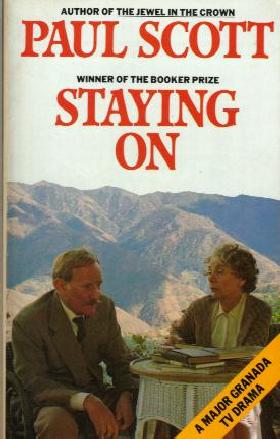
Paul Scott
The following novels constitute the shortlist for the 1977 Booker Prize:
Notable Omissions from the 1977 Shortlist

|
Staying On Paul Scott |
Quotes:
"Of all the books I read, Staying On was, simply, the most moving...Paul Scott brings
his two main themes to triumphant resolution: the end of an empire, and the end of a long,
inarticulate love that is as poignant as it is convincing. Staying On covers only a
few months, but it carries the emotional impact of a lifetime, even a civilization" -
Philip Larkin, chairman of the judges for the Booker Prize
"From the absurd ironies of the human condition Paul Scott wrings the unresisting
acknowledgement of laughter. He sets up, for us to love, a superb gallery of larger than
life caricatures who, by some alchemy of art, grow into charcaters to whom one can relate as
personally as Foster would have wished...This is a rich and joyful book written by a man who
has known and loved anoher country well enough to be brilliantly disrespectful of it -
Jeremy Brooks, Sunday Times
"Certainly his funniest...and, I think, his best...It is a first-class book and deserves to be
remembered for a long time" - Auberon Waugh, Evening Standard
First Paragraph:
When Tusker Smalley died of a massive coronary at approximately 9.30 a.m. on the last Monday in April 1972 his wife Lucy was out, having her white hair blue-rinsed and set in the Seraglio Room on the ground floor or Pankot's new five-storey glass and concrete hotel, the Shiraz.
The Shiraz was only a step or two away from the little hill station's older hotel, Smith's, whose annexe had been occupied by Tusker and Lucy for ten years. The annexe, known as The Lodge, was a small bungalow in what had once been an adjacent but separate compound, a section of whose dividing wall had been knocked down and a path trodden to create an illusion of connection between hotel and annexe. The old gateway into The Lodge's compound, now known as the side-entrance, gave on to a lane. Immediately opposite was the Shiraz.
From the Granada paperback edition, 1984.
Notes:
Granda TV dramatised this novel for television, featuring Trevor Howard and Celia Johnson.
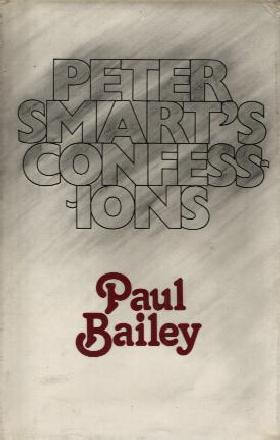
|
Peter Smart's Confessions Paul Bailey |
Dustjacket synopsis:
"Peter Smart is a man with a highly developed sense of his own inadequacy - a gentle person whose self-induced confession
of his past failures gradually but perceptibly evolves into a grotesque portrait gallery of the extraordinary people who
have always surrounded him. As he sits down at his wobbly table to bare his soul, Peter Smart finds, to his surprise,
that it is these other personalities who fascinate and command the stage. In youth he has been flanked by a virago of a
mother, aptly dubbed by her in-laws as 'mouth and trousers'; by mother's decrepit paramour, Dr Leonard Cottie, author of
the astonishingly boring With Stethoscope and Scapel; his 'brownish' grandmother, who, cosily reeking of beer and
tobacco, chuckles over 'penny dreadfulls' like Ainslie Gritter's The Fatal Cup of Cocoa.
"As his acting career develops from a tremulous schoolboy's Lady Macbeth into what is nationally acclaimed as the 'definitive Reynoldo', Peter Smart is introduced to the dimming lustre of the provincial stage and such rich personalities as Neville Drake, who exists in a Wagnerian shrine and whose extravagant appetite for champagne is matched only by the extravagance of his debts. Peter survives an impossible marriage to the self-destructive Nancy, whom he has rescued on a London bridge from which he was just about to leap himself; and also bitter disappointment when the son he has raised single-handed dons the saffron and sandals of a Hare Krishna disciple.
"As Peter reflectively sifts through his past, one is deeply struck with his sense of loneliness and displacement, with the casual cruelty of life. Yet one is caught, mesmerized, as is Peter, by the delightful absurdity of the whole performance, the diverting comedy that rises to the surface of even the most melancholy lives."
First Paragraph:
He had succeeded at last. Never again would he suffer humiliation and defeat. He was with the majority now.
He saw a buxom angel approaching. He would accept her apologies for Saint Peter's absence humbly and gratefully: 'How kind of him to send you.' He reckoned she must be Muriel, whom God had appointed to represent the month of June. The skilful manner in which she jumped over each dangerous stretch of blue proved her to be one well acquainted with the peculiar hazards of celestial life.
Muriel passed without a word. Her raiment, he noticed, had lost its sheen. It had the washed-out look of hospital clothes.
He waited. Other angels came and went. They were all as drably dressed as Muriel, and like her they ignored him. Did the fools imagine that he would be upset by their indifference? He smiled at the notion. He was beyond such mundane hurts: he was extinct, and he felt radiant.
In this blissful condition, he looked about him. There was nothing here to enchant the eye or quicken the heart. Heaven, he realized, must have its suburbs too. God's civil servants had to function somewhere. Wingless, deprived of harps and lyres, the far from serene creatures who hurried by were obviously preoccupied with affairs of state. Cabbalists in the fourteenth century had worked out that there were 301,655,722 attendant spirits -it stood to reason, then, that they had to be a variegated lbt 'It takes all sorts,'he heard himself say. He couldn't remember ever mouthin such a commonplace on earth.
From the Jonathan Cape hardback edition, 1977.
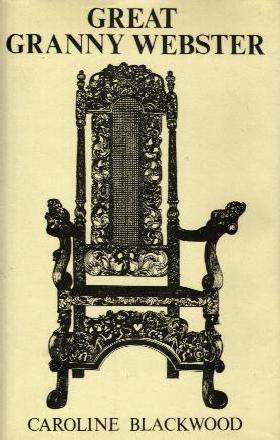
|
Great Granny Webster Caroline Blackwood |
Dustjacket synopsis:
"The theme of Caroline Blackwood's new novel is the relentless recurrence of madness in different guises in a family over
three generations.
"Great Granny Webster, as she sat silent and impassive in her straight-backed hard Victorian gothic chair, was the embodiment of everything that was 'correct' in the traditions of her aristocratic family. But the insidious effect of this terrible old woman upon her daughter - immured in a decaying palatial Anglo-Irish house-her grandchildren in the frivolous world of the twenties, and the shy young girl who came to stay with her after the war in Hove, was far- reaching.
"Great Granny Webster survived the cataclysm of two world wars and lived to see the decline of her sacred values. The extraordinary moment at the end when, by the cruelty of fate, she loses all propriety provides an ironical and haunting climax to this powerful novel."
Quotes:
"Caroline Blackwood has power, imagination, wit and above all precision .... There is a singular quality about her. She
writes about the unbearable, but not unbearably..." - Gabriele Annan, The Listener
First Paragraph:
I was sent to stay with her two years after the war had ended, but in her house it seemed to be war-time. Her blinds and curtains were often drawn even during the day as if she was still preserving some kind of conscientious 'black-out'. I think she was more frightened of the sun than she had ever been of German raids. She owned gloomy and valuable Persian carpets and it seemed to be her terror that some stray and sneaking sunbeam would creep in and make them fade.
The house of Great Granny Webster gave out the same damp feeling of cold that one experiences in many churches. We used to eat our meals on trays in front of the fire, but the chill of those meals was increased by the fact that for reasons of economy the fire was laid but never lit. In a period of post-war austerity Great Granny Webster managed to make the meals she served seem far more austere and rationed than anyone else's. This had something to do with the way her food was always served on her own priceless silver, which was polished every day in the basement by a crippled maid whom she called by her surname, Richards.
From the Duckworth hardback edition, 1977.

|
Shadows on Our Skin Jennifer Johnston |
Dustjacket synopsis:
"Joe Logan lives with his parents in Derry, where British soldiers are a familiar sight, and the sudden smashing and
crashing of unexpected raids breaks the peace of the nights...
"One winter he befriends a stranger to Derry, lonely school teacher Kathleen Doherty. And his elder brother returns from London with money to spend and a gun in his pocket. Suddenly, Joe's childhood is over, his innocence destroyed."
Quotes:
"The whole of sad Ireland seems compressed into a thin sheaf, with sharpness, humour and not one scruple of
sentimentality...This is unique and perfect art." - Anthony Burgess, Irish Press
"A book which reverberates in the mind long after the last page has been reached." - Maurice Leitch, Hibernia
"One of the very best books about life in a country brimming over with hate." - Derek Stanford, Scotsman
First Paragraph:
Father, you had to go away.
And sadly I have had to stay.
I am sad we had to part.
I will miss you in my heart.
He chewed the end of his pen and tried to visualise the words printed in the Journal, even perhaps with the importance of a thick black line around them, presenting them to the world. No, anyway. He crossed them out, carefully inking out each word so that no one would be able to read it.
Dear father I am sad you had to go.
So, blow, flow, po...ha ha...slow, oh, oh, oh.
Miss McCabe's chalk squealed pitifully on the blackboard. A triangle. Three sides. A.B.C. Three angles. Triangle.
He saw his father propped against grey pillows, his head folded down into his shoulders like some ancient bird.
From the Flamingo paperback edition, 1986.
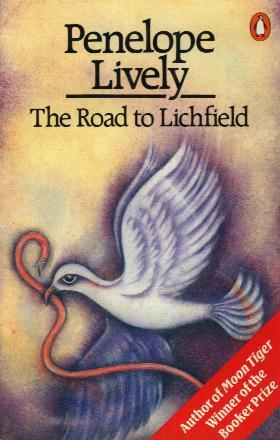
|
The Road to Lichfield Penelope Lively |
Dustjacket synopsis:
"The road to Lichfield divided Anne Linton's life into two.
"As she travels back and forth between her home and her dying father, it leads her from safe, familiar marriage inot th eunchartered territory of a lingering summer love-affair and then into surprising revelations about her father.
"Altogether, it was for Anne a strange and troubling journey into rediscovery.
"Incisive, funny, sad, The Road to Lichfield prises apart the twin processes of dying and loving and brilliantly traces the potent effect of the past on the present."
Quotes:
"The book is lifted out of the ordinary by its author's treatment of her two main themes:
continuity and memory" - Listener
First Paragraph:
Anne Linton drove north to Lichfield through the morning. Berkshire gave way to Oxfordshire, Oxfordshire to Warwickshire, and Warwickshire to Staffordshire. A scum of insects gathered at the edge of the windscreen; the landscape lay misty and unreal at either side of the car, the road slicing through the field and villages as though it were of a different dimension, a different order of things. From time to time towns offered themselves on signposts - Daventry 12, Stratford 8, Birmingham 17. They seemed like actors in the wings, and the landscape itself a palimpest, suggesting another time, another place. Edgehill recalled the Civil War; Tamworth, lurking over to the right, had something Saxon about it, she seemed to remember. Her own past, too, waved a cheery hand from over the horizon, on the other side of a motorway interchange. In Stratford, once, on a wedding anniversary outing to a production to Much Ado she and Don had discussed on the banks of the Avon whether or not to conceive another child. And in Oxford - well, in Oxford of course a great deal more than that had happened. She had thought of that last night, planning her journey. Private and public memory, it seemed, were fused on the R.A.C. Route Guide.
From the Penguin paperback edition, 1983.
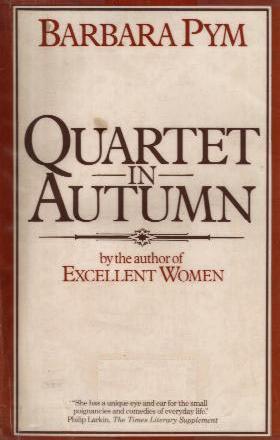
|
Quartet in Autumn Barbara Pym |
Dustjacket synopsis:
"Barbara Pym was listed by Lord David Cecil and Philip Larkin as an underrated novelest in a recent symposium in the
Times Literary Supplement. Philip Larkin wrote: 'She has a unique eye and ear for the small poignancies and
comedies of everyday life.' Certainly her new novel, Quartet in Autumn, bears this out.
"It is the story of four people in late middle-age - Edwin, Norman, Letty and Marcia - whose chief point of contact, at least until the two women retire, is that they work in the same office. They suffer the same problem - loneliness. Lovingly, poignantly, satirically in the gentlest but sharpest way. Miss Pym conducts us through their small lives and the facade they erect to defend themselves against the outside world. her concerns are with the awfulness of the big city, the irrelevance of the Welfare State, at least in such cases as these. But the book is also funny; there is an obstinate optimism in her characters so that in the end they all in their different ways win through to a kind of hope."
First Paragraph:
That day the four of them went to the library, though at different times. The library assistant, if he had noticed them at all, would have seen them as people who belonged together in some way. They each in turn noticed him; with his shoulder-length golden hair. Their disparaging comments on its length, its luxuriance, its general unsuitability - given the job and the circumstances - were no doubt reflections on the shortcomings of their own hair. Edwin wore his, which was thin, greying and bald on top, in a sort of bob - 'even older gentlemen are wearing it longer now', his barber had told him - and the style was an easy one which Edwin considered not unbecoming to a man in his early sixties. Norman, on the other hand, had always had 'difficult' hair, coarse, bristly and now iron-grey, which in his younger days had refused to lie down flat at the crown and round the parting. Now he did not have to part it and had adopted a medieval or pudding-basin style, rather like the American crew-cut of the forties and fifties. The two women - Letty and Marcia - had hair as different from each other as it was possible to imagine in the nineteen seventies, when most women in their sixties had a regular appointment at the hairdresser for the arrangement of their short white, grey or dyed red curls. Letty had faded light brown hair, worn rather too long and in quality as soft and wispy as Edwin's was. People sometimes said - though less often now - how lucky she was not to have gone grey, but Letty knew that there were white hairs interspersed with the brown and that most people would have had a brightening 'rinse' anyway. Marcia's short, stiff, lifeless hair was uncompromisingly dyed a harsh dark brown from a bottle in the bathroom cupboard, which she had used ever since she had noticed the first white hairs some thirty years earlier. If there were now softer and more becoming ways of colouring one's hair, Marcia was unaware of them.
From the MacMillan hardback edition, 1977.
Notable Omissions from the Shortlist:
"Injury Time", Beryl Bainbridge
"The Ice Age", Margaret Drabble
"The Golden Honeycomb", Kamala Markandaya
"No Home But the Struggle", Edward Upward
This page and its contents are copyright © 2002 by Perry Middlemiss, Melbourne, Victoria, Australia.
Last modified: March 28, 2002.